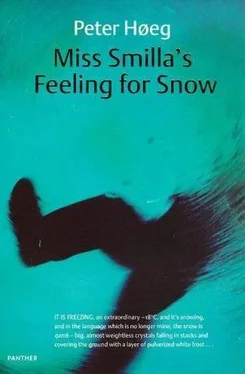Peter Høeg - Smilla's Sense of Snow aka Miss Smilla's Feeling for Snow
Здесь есть возможность читать онлайн «Peter Høeg - Smilla's Sense of Snow aka Miss Smilla's Feeling for Snow» весь текст электронной книги совершенно бесплатно (целиком полную версию без сокращений). В некоторых случаях можно слушать аудио, скачать через торрент в формате fb2 и присутствует краткое содержание. Жанр: Современная проза, на английском языке. Описание произведения, (предисловие) а так же отзывы посетителей доступны на портале библиотеки ЛибКат.
- Название:Smilla's Sense of Snow aka Miss Smilla's Feeling for Snow
- Автор:
- Жанр:
- Год:неизвестен
- ISBN:нет данных
- Рейтинг книги:3 / 5. Голосов: 1
-
Избранное:Добавить в избранное
- Отзывы:
-
Ваша оценка:
- 60
- 1
- 2
- 3
- 4
- 5
Smilla's Sense of Snow aka Miss Smilla's Feeling for Snow: краткое содержание, описание и аннотация
Предлагаем к чтению аннотацию, описание, краткое содержание или предисловие (зависит от того, что написал сам автор книги «Smilla's Sense of Snow aka Miss Smilla's Feeling for Snow»). Если вы не нашли необходимую информацию о книге — напишите в комментариях, мы постараемся отыскать её.
Smilla's Sense of Snow aka Miss Smilla's Feeling for Snow — читать онлайн бесплатно полную книгу (весь текст) целиком
Ниже представлен текст книги, разбитый по страницам. Система сохранения места последней прочитанной страницы, позволяет с удобством читать онлайн бесплатно книгу «Smilla's Sense of Snow aka Miss Smilla's Feeling for Snow», без необходимости каждый раз заново искать на чём Вы остановились. Поставьте закладку, и сможете в любой момент перейти на страницу, на которой закончили чтение.
Интервал:
Закладка:
The bottle is empty.
"That was a good idea with the fire alarm," I say.
He smiles wearily. "It was the only way to put the papers back and at the same t-time explain why they were wet."
We're sitting at opposite ends of the bed. The Kronos is moving more and more slowly. A gloomy and lively battle is raging inside my body between two kinds of poison: the crystal-clear unreality of the amphetamines and the fuzzy pleasure of the alcohol.
"It was when Juliane told you that Loyen had regularly examined Isaiah that I decided it might have something to do with a disease. But when I saw the X-rays, I was convinced. X-rays from the expedition in '66. Lagermann got them from Queen Ingrid's Hospital in Nuuk. They didn't die from the explosion. They were attacked by some kind of parasite. Maybe some sort of worm. But bigger than any I've ever seen. And faster. They died within a few days. Maybe in a few hours. Loyen wanted to find out whether Isaiah had been infected."
The mechanic shakes his head. He doesn't want to believe me. He's on a treasure hunt. On his way to find diamonds.
"That's why Loyen has been involved right from the start. He's a scientist. Money is secondary. He was after the Nobel Prize. He's been anticipating a scientific sensation from the moment he found out about it back in the forties."
"Why didn't they tell me all this?" he asks.
We all live our lives blindly believing in the people who make the decisions. Believing in science. Because the world is inscrutable and all information is hazy. We accept the existence of a round globe, of an atom's nucleus that sticks together like drops, of a shrinking universeand the necessity of interfering with genetic material. Not because we know these things are true, but because we believe the people who tell us so. We are all proselytes of science. And, in contrast to the followers of other religions, we can no longer bridge the gap between ourselves and the priests. Problems arise when we stumble on an outright lie. And it affects our own lives. The mechanic's panic is that of a child who for the first time catches his parents in a lie he had always suspected.
"Isaiah's father was diving," I say. "Presumably the others were, too. Most parasites go through a stage in water. You're going to dive, and you'll get others to dive. You're the last person they're going to tell."
Emotion drives him to his feet.
"You have to help me make a phone call," I say.
As I stand up, my hand closes around a piece of metal wrapped in a cloth in the drawer, and around a flat, round container.
The radio room is located behind the bridge, across from the officers' mess. We manage to make it there without being seen. Outside the door I hesitate. He shakes his head.
"It's empty. The IMO requires it to be manned twice an hour, but we have no radio technician on board. Instead, they set the HF at 2182 kHz, the international emergency frequency, and then they connect it to an alarm which sounds when someone sends a distress signal.
Jakkelsen's key won't open the door. I feel an urge to scream.
"I have to get inside," I say. The mechanic shrugs.
"You owe it to both of us," I say.
He still wavers for a moment. Then he carefully places his hands on the door handle and pushes the door in. There's no splintering of wood, only a scraping sound as the latch forces the steel frame inward.
The room is quite small and crammed with equipment. There's a little VHF, a double longwave transmitter the size of a refrigerator, some kind of box that I've never seen before, with a Morse sender mounted on top. A desk, chairs, telex machine, fax, and a coffee machine with sugar and plastic cups. On the wall there's a clock with paper triangles of different colors taped to its face, a mobile telephone, a calendar, equipment certificates in thin steel frames, and a license certifying Sonne as a radio operator. On the desk there's a tape recorder that has been screwed down, manuals, and an open radio log.
I write the number on a piece of paper. "This is Ravn's number," I say.
He freezes. I take him by the arm, thinking that this is the last time in my life I'll ever touch him.
He sits down in the chair and is transformed into a different person. His movements become quick, precise, and authoritative, just like in his kitchen. He taps on the face of the clock.
"The triangles indicate the internationally established times when the channels have to be kept free and open for distress signals. If we go into that time the alarm will go off. For the HF this means within three minutes past the half hour and the hour. We have ten minutes."
He hands me a telephone receiver, taking the main receiver himself. I sit down next to him.
"It's hopeless in this weather and this far from the coast," he says.
At first I can follow what he's doing, even though I couldn't have done it myself.
He selects the maximum output of 200 watts. At that level the transmitter risks drowning out its own signal, but the bad weather and distance from shore make it necessary.
There's the crackling of empty space, and then a voice comes through.
"This is Sisimiut. What can we do for you?"
He decides to transmit on the carrier wave. The transmitter has analog readouts and automatic settings. Now it will continue to adjust according to the carrier wave while the conversation is transmitted over a side band. It's the most efficient method, and probably the only one on a night like this.
Right before he sets the dials, the receiver, picks up a Canadian station sending classical music over the shortwave net. For a moment the room disappears, as I'm overwhelmed by childhood memories. It's Victor Halkenhvad singing Gurrelieder. Then Sisimiut is back.
The mechanic doesn't ask for Lyngby Radio. He asks for Reykjavik. When the station responds, he asks for Torshavn.
"What's happening?" I ask.
He covers the microphone. "All the larger stations have an automatic directional finder that is switched on when they receive a call. They compute the costs for a conversation under the name of the ship you give. In case a false name is used, they take a bearing on the ship's position, so that a conversation can always be charged back to a set of coordinates. I'm creating a smokescreen. With every new station it'll be harder to trace the call. By the fourth linkup it'll be impossible."
He gets Lyngby Radio, tells them he's calling from the good ship Candy 2, and gives them Ravn's number. He gives me a long look. We both know that if I demand a different procedure, a direct call that would make it possible for Ravn to track the position of the Kronos, the mechanic will break off the connection. I don't say a word. I've already pressed him too hard. And we're not done yet.
He requests a security line. Far away, in a different part of the world, a telephone rings. The signal is faint and intermittent.
"What's it like outside, Smilla?"
I try to remember the night and the weather. "Clouds with ice crystals."
"That's the worst. The HF beams arc along the atmosphere. When it's overcast or snowing, they can get caught in a reflection trap."
The telephone rings, monotone and lifeless. I give up. Hopelessness is a numbness that emanates from your gut. Then someone picks up the phone.
"Yes?"
The voice is close, crystal-clear, but groggy with sleep. It must be about five in the morning in Denmark.
I envision her the way she looked in the photos in Ravn's wallet. White-haired, wearing a wool suit. "May I speak to Ravn?"
As she puts down the receiver, a child starts crying nearby. It must be sleeping in their bedroom. Maybe between them in the bed.
"Ravn here."
"It's me," I say.
"You'll have to call some other time."
Because his voice comes through so clearly, the rejection is quite clear, as well. I don't know what has happened. But now I've gone too far to wonder about it.
Читать дальшеИнтервал:
Закладка:
Похожие книги на «Smilla's Sense of Snow aka Miss Smilla's Feeling for Snow»
Представляем Вашему вниманию похожие книги на «Smilla's Sense of Snow aka Miss Smilla's Feeling for Snow» списком для выбора. Мы отобрали схожую по названию и смыслу литературу в надежде предоставить читателям больше вариантов отыскать новые, интересные, ещё непрочитанные произведения.
Обсуждение, отзывы о книге «Smilla's Sense of Snow aka Miss Smilla's Feeling for Snow» и просто собственные мнения читателей. Оставьте ваши комментарии, напишите, что Вы думаете о произведении, его смысле или главных героях. Укажите что конкретно понравилось, а что нет, и почему Вы так считаете.




![Рута Шепетис - Ashes in the Snow [aka Between Shades of Gray]](/books/414915/ruta-shepetis-ashes-in-the-snow-aka-between-shades-thumb.webp)







